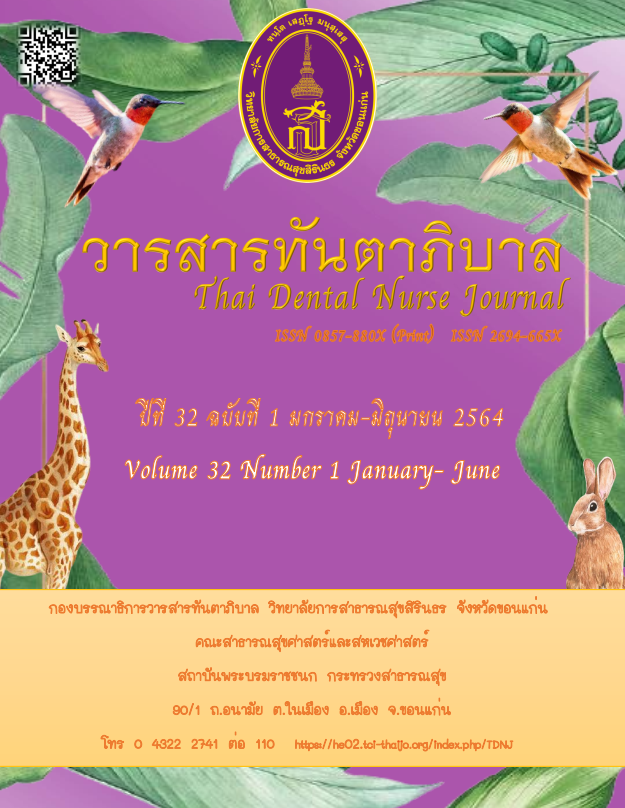The Effectiveness of the learning Program based on Self-Efficacy Theory on Oral Health Literacy Improvement of the Dental Public Health student of Sirindhorn College of Public Health Khon Kaen
Keywords:
Oral Health literacy, cognitive, self-management, decision-makingAbstract
Abstract
Oral Health Literacy Improvement of the Dental Public Health student, who will continue to work closely with the people, are very important, because they have responsibility to be a good role model and health educator to keep their oral hygiene. The aim of this study was to examine the effectiveness of Oral Health Literacy Improvement: Cognitive skill, Self-management skill and Decision skill based on Self-Efficacy Learning Program among 1st year Dental Public Health student of Sirindhorn College of Public Health Khon Kaen. This program consisted 53 students who received weekly activies: Vicarious Experience, Mastery Experience, Verbal Persuasion and Emotional Arousal. Paired Sample T-Test was used to compare the results of this learning program with baseline measurements and eight weeks after implementation.
The results revealed that the mean score of the Oral Health Literacy: Cognitive skill, Self-management skill and Decision skill were statistically significant difference between pre-test and post-test. The mean score of post-test was higher than the mean score of pre-test.
These results have the important implications for lecturer in Dental Public Health Curriculum to add the learning activity based on Self-Efficacy Theory. For the practice modification on the good oral health status, the further research is needed to study the intervention program of the Oral Health Literacy Improvement based on Self-Efficacy or the other theory.
References
2560.[เข้าถึงเมื่อ2561สิงหาคม 28];เข้าถึงได้จาก :http://www.dental2.anamai.moph.go.th>ewt_dl_link
2. พรปวีณ์ แก้วนพรัตน์, อัจศรา ประเสริฐสิน, อมราพร สุรการ. การวิเคราะห์องค์ประกอบเชิงยืนยันของความฉลาดทางสุขภาพของนิสิตนักศึกษาระดับปริญญาตรี. วารสารวิชาการสาธารณสุข 2560; 26(2):382-389.
3. Lee,E-H., Lee,W.Y., Moon,H.S. A Structural Equation Model Linking Health Literacy to Self-efficacy, Self-care Activities, and Health-related Quality of Life in Patients with Type 2 Diabetes. Asian Nursing Research[Internet]. 2016[cited 2019 August 1]; 10(1):82-87. Available from
https:// www.sciencedirect.com/science/article/pii/s1976131716000153.
4. Jake,J., Kalenda,J., Gavora,P. Self-regulation and academic self-efficacy of Czech university students. Procedia-Social and Behavioral Science[Internet]. 2015 [cited 2019 August 1];174:1117-1123. Available from https:// www.sciencedirect.com/science/article/pii/s1877042815008551.
5. Crisan,C., Turda,S. The connection between the level of career indecision and the perceived self-efficacy on the career decision-making among teenagers. Procedia-Social and Behavioral Sciences[Internet].2015[cited 2019 August 1];209:154-160. Available from
https://www.sciencedirect.com/science/article/pii/s1877042815056189.
6. Chen,C., Feng,X., Li,Y-T., Zhang,Q., Jin,Y-S. Development and validation of a self-management ability questionnaire for patients with chronic periodontitis. International Journal of Nursing Sciences[Internet].2019[cited 2019 August 1];6(3):259-265. Available from:
https:// www.sciencedirect.com/science/article/pii/s235201321830423X.
Chen,C.,Feng,X.,Li,Y-T.,Zhang,Q.,Jin,Y-S.(2019)
7. Gist,M.E., Gist,A. Self-Efficacy.[Internet]. 2016[cited 2020 May 29] Available from:
https://www.oxfordbibliographies.com/view/document/obo-9780199846740/obo-9780199846740-0043.xml.
8. Yang.C., Zhou.Y., Cao,Q., Xia,M., An.J. The Relationship Between Self-Control and Self-Efficacy Among Patients With Substance Use Disorders: Resilience and Self-Esteem as Mediators. Front Psychiatry [Internet].2019[cited 2020 May 29];10: 333-339. Available from
https://www.ncbi.nlm.nih.gov/pmc/articles/pmc6582546.
9. Tinaz,S., Elfil,M., Kamel,S., Aravala,S.S., Louis,D.E., Sinha,R. Goal-directed behavior inindividuals with mild Parkinson’s disease: Role of self-efficacy and self-regulation.Clinical Parkinsionism & Related Disorder[Internet]. 2020[cited 2020 May 22];3: 100051. Available from
https://www.sciencedirect.com/science/article/pii/S2590112520300190.
10. Zhou,G., Sun,C., Knoll,N., Hamilton,K., Schwarzer,R. Self-efficacy, planning and action control in an oral self-care intervention. Health Education Research [Internet]. 2015 [cited 2020 May 22];30(4), 671-681. Available from https://www.researchgate.net/publication/280116236
_Self-efficacy_planning_and_action_control_in_an_oral_self-care_intervention.
11. Greenberger.C., Dror,Y.F., Lev,I., Hazoref,R.H. The inter-relationships between self-efficacy
self-management, depression and glycaemic control in Israeli people with type 2 diabetes. Journal of Diabetes Nursing[Internet]. (2014) [cited 2020 May 29];18(8): 333-339. Available from
https://www.scientdirect.com/science/article/pii/s1936657420300480.
12. ณัฐวุธ แก้วสุทธา, อังศินันท์ อินทรกำแหง, พัชรี ดวงจันทร์. ปัจจัยเชิงสาเหตุของพฤติกรรมการดูแลอนามัยช่องปากของวัยรุ่นตอนต้น. วารสารพฤติกรรมศาสตร์ 2556;19(2):153-163.
13. Leslie,B.B., Moilanen,J. Advancing Self-Efficacy and Intuitive Decision-Making Calls to Action. Adult Education Research Conference [Internet].2010 [cited 2020 May 29]. Available from https://www.newprairiepress.org/aerc/2010/roundtables/8.
14. Ogutu,J.P., Odera,P., Maragia,S.N. Self-Efficacy as a Predictor of Career Decision Making Among Secondary School Students in Busia County,Kenya. Journal of Education and Practice [Internet]. 2017[cited 2020 June 2];8(11): 20-29. Available from
https://files.eric.ed.gov/fulltext/EJ1139690.pdf.
15. Choi,M., Kim,J. Relationships Between Clinical Decision-Making Patterns and Self-Efficacy and Nursing Professionalism in Korean Pediatric Nurses. Journal of Pediatric Nursing[Internet]. 2015 [cited 2020 June 2];30(6), e81-e88. Available from
https://www.sciencedirect.com/science/article/pii/s0882596315002225.
16. Farcic,N., Barac,I., Pluzaric,J., Ilakovac,V., Pacaric,S., Gvozdanovic,Z., & et.al. Personality traits of core self-evaluation as predictors on clinical decision-making in nursing profession. Journal Plus One[Internet]. 2020 [cited 2020 June 2]. Available from
https://journals.plos.org/plosone/article?id=10.1371/journal.pone.0233435.
17. Cope,L.C., Tully,M.P., Hall,J. (2020) An exploration of the perceptions of non-medical prescribers, regarding their self-efficacy when prescribing, and their willingness to take responsibility for prescribing decisions. Research in Social and Administrative Pharmacy[Internet].2020[cited 2020 May 29]; 16(2): 249-256. Available from
https://www.sciencedirect.com/science/article/article/abs/pii/s1551741118305874.
18. Lee,J.Y., Divaris,K., Baker,A.D., Rozier,R.G., Vann,Jr.WF. The Relationship of Oral Health
Literacy and Self-Efficacy With Oral Health Status and Dental Neglect. AM J Public Health [Internet].2012 [cited 2020 May 29];102(5):923-929. Available from
https://www.ncbi.nim.nih.gov/pmc/articles/PMC3267012.
Downloads
Published
Issue
Section
License
บทความที่ได้รับการตีพิมพ์ถือเป็นลิขสิทธิ์ของวารสารทันตาภิบาล





